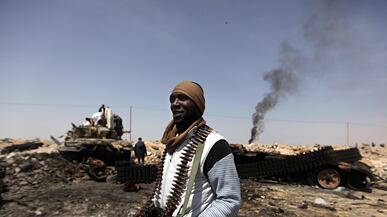Dozens of cars—honking their horns, flashing their lights, and carrying the red, black, and green flag of the Libyan opposition—sped down the highway west of Benghazi this morning. The jubilant mob was headed toward Ajdabiya, a key town held by Moammar Gaddafi's forces for 10 days which was pounded by coalition airstrikes overnight. The destruction wrought by those airstrikes was on display at the eastern edge of the city: the remnants of nine charred, demolished tanks lay beside the road, some of them still smoldering. One tank had been completely flipped over by a blast. Empty shell casings and the supplies used by the troops—tuna cans, juice cartons, cigarette packets—were also scattered across the sand dunes bordering the road.
Rebel fighters ripped round after round of celebratory gunshots in the air as the cars, some of whom appeared to be returning families, streamed back into town. Many passengers had their phones or camcorders out filming the destruction as they drove along. Some looted ammo boxes or stripped wiring from burned out vehicles. Among those heading back in was Hani Ali, 32, who was sitting in a pickup truck crammed full of live chickens in wooden crates. "We haven't been able to work because of all the fighting," said Ali, who fled the town three days ago. "It's still not safe but we have work to do." Moments later, Ali, a stocky young man dressed in a dark gray traditional robe, pulled out four squawking chickens from the back of the pickup truck and handed them off to rebel fighters.

After days of stalemate the fall of Ajdabiya could prove to be a turning point for the rebels, who, until now, have not been able to capitalize on coalition airstrikes to regain their momentum on the battlefield. The blasted up hardware around Ajdabiya, which included armored personnel carriers, anti-aircraft vehicles, and even GRAD rocket launchers along with the tanks, shows that the rebels were obviously outgunned. Whether they will now be able to organize their fighters and go on the offensive remains an open question.
But what's clear is that the coalition airstrikes may have helped avert a humanitarian disaster in Ajdabiya, a city of some 140,000 residents. As soon as Gaddafi's troops came into town 10 days ago, they began targeting civilians, residents said. "They were acting like robbers, breaking into houses and arresting people," said Salem Ali, 36, a drilling foreman for an oil company who lives in Ajdabiya. Militiamen in plainclothes took potshots at civilians in the street. Shops were shot up and burned. Thousands of people fled. "We received reports of considerable displacement," said Simon Brooks, the head of the International Committee of the Red Cross in Benghazi, noting that up to 25,000 people may have escaped the fighting. Many of those displaced families moved in with friends and relatives in small towns nearby, while others went to Benghazi.
After days of stalemate the fall of Ajdabiya could prove to be a turning point for the rebels.
When the rebels fought for control of the city center last week, many of Gaddafi's troops pulled back to the city limits and tried to choke them out. Water and electricity were cut and food supplies began to run low. Then the shelling began. Khamis Fakhri was at a neighborhood mosque with his two young sons earlier this week when a shell hit the building. They fled back to their house where they were the only residents left on the street. The shells continued to fall all around them. "There were bodies in the street but we couldn't go near them," said Fakhri, a soft-spoken man who's missing several front teeth. The city had become a desolate ghost town. Three days ago, a shell leveled their neighbor's house. "The kids were screaming," said Fakhri, shaking his head. He got his sons in their car and took a risky trip through checkpoints manned by Gaddafi's soldiers to reach Benghazi.
Remarkably, a staff of 20 stuck it out at the hospital in Ajdabiya through the fighting. Six days ago, a group of 10 Gaddafi loyalists stormed the hospital. They stuck an AK-47 against Dr. Ramzi Lawami's neck and demanded that six of their wounded comrades be treated. They had shrapnel wounds from a coalition airstrike and Lawami, 30, explained that they would not be able to survive a transfer of hundreds of miles back to their base in Sert. The wounded were left behind and were eventually captured by the rebels. Despite the hardship of the past couple of weeks, Lawami, who's decked out in green scrubs, doesn't seem shaken up. "Now I can't sleep without bombs," he joked grimly in English. "I must have bombs to fall asleep."
While the mood among the rebel fighters in Ajdabiya was jubilant today, the city was far from normal. The remnants of the fighting were all around: broken glass in storefronts, shot-up cars and demolished walls. Gunshot blasts and explosions rang out regularly, some of which was celebratory fire but at times it was impossible to tell. Around 1 p.m. an exchange of heavy gunfire broke out about half a mile away from the hospital and black smoke rose up from the site. The biggest concern seemed to be plainclothes Gaddafi supporters hiding out in the town. "The civilians are foolish to come back," said Salah Maaloum, a 24-year old rebel fighter with a black beard and black beret. "There are snipers hiding in schools and homes." Maaloum isn't just speculating. He came into the city at 2:30 a.m. last night with the first group of rebel troops and they caught two female snipers on the roof of the hospital. He said it will take a few days to clear the city out but he's optimistic the rebels will push on. "We will go to Tripoli, inshallah," he said.
Babak Dehghanpisheh is Newsweek's Beirut Bureau Chief. He's been covering the Middle East for Newsweek since 2001.





